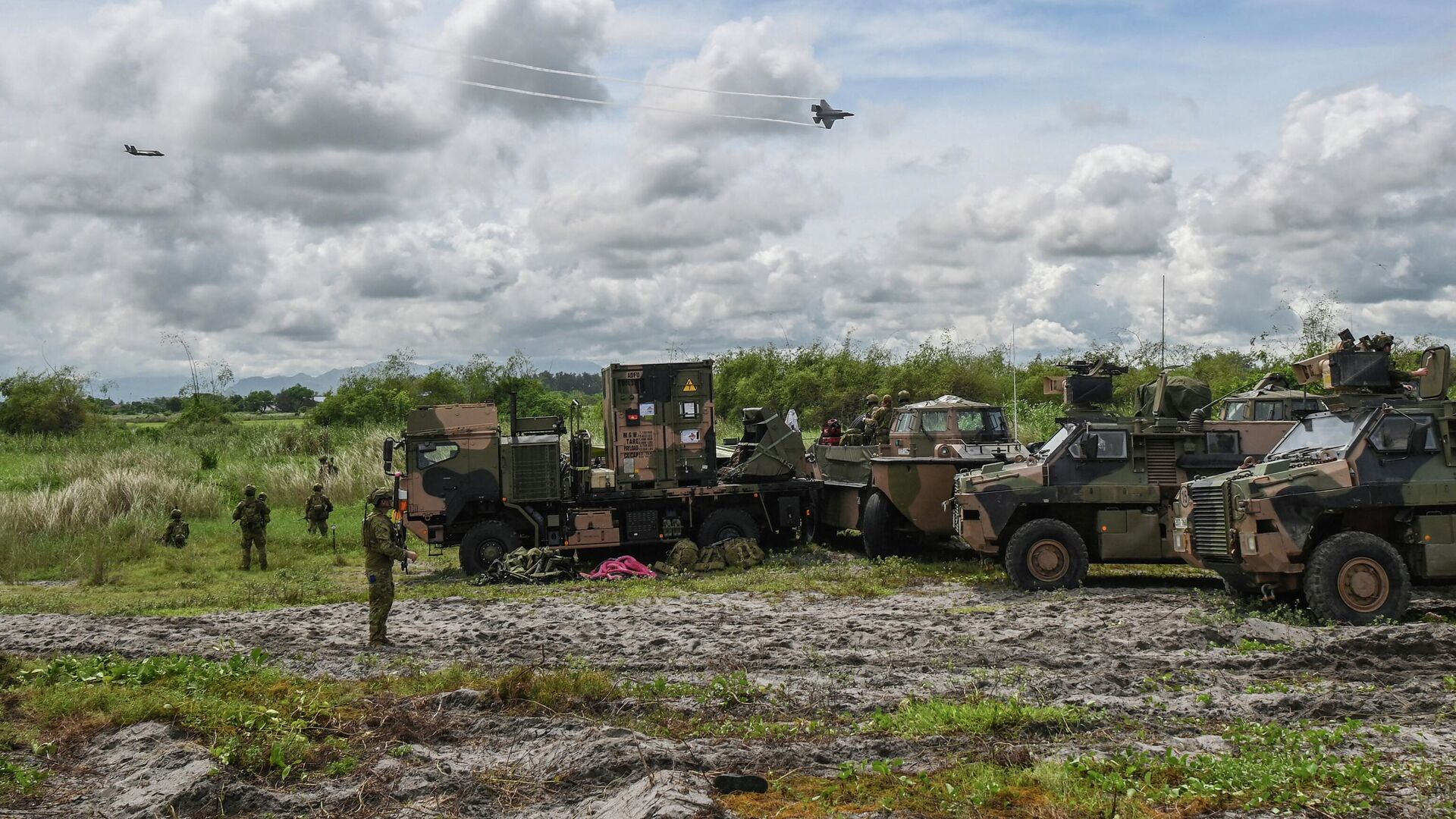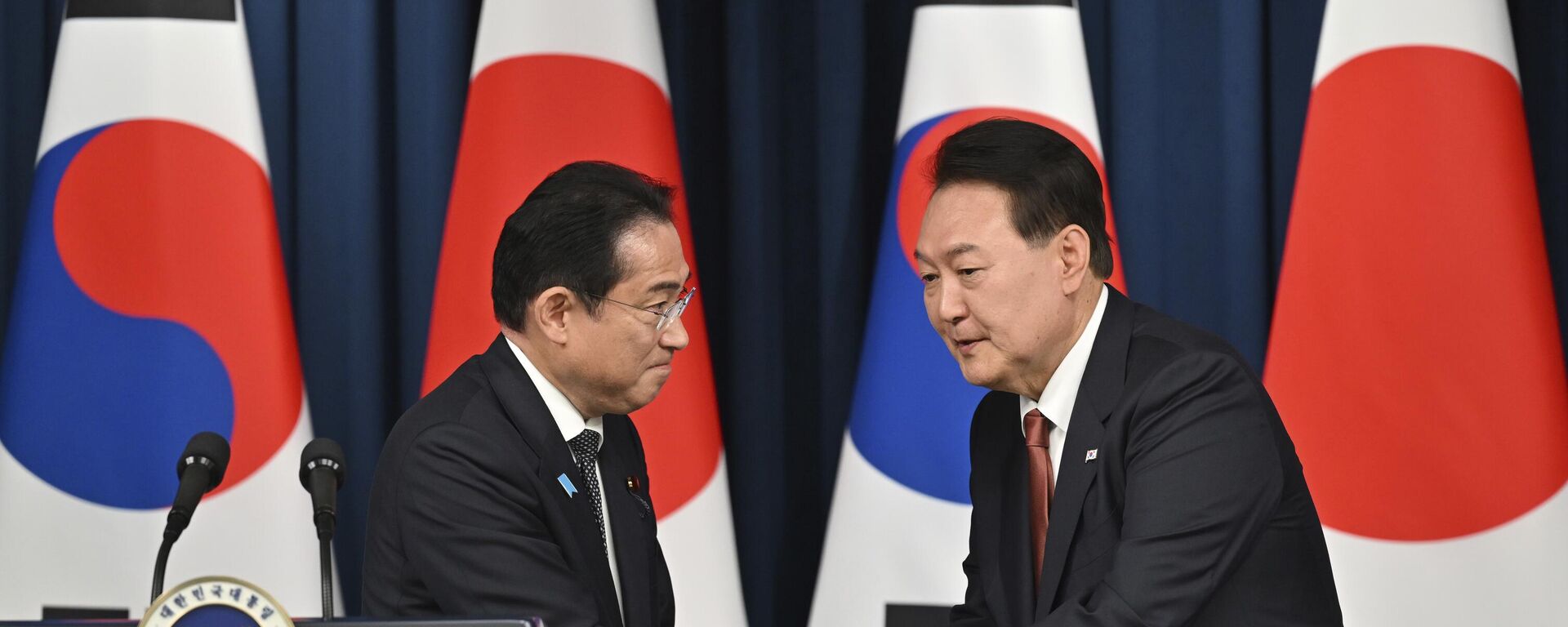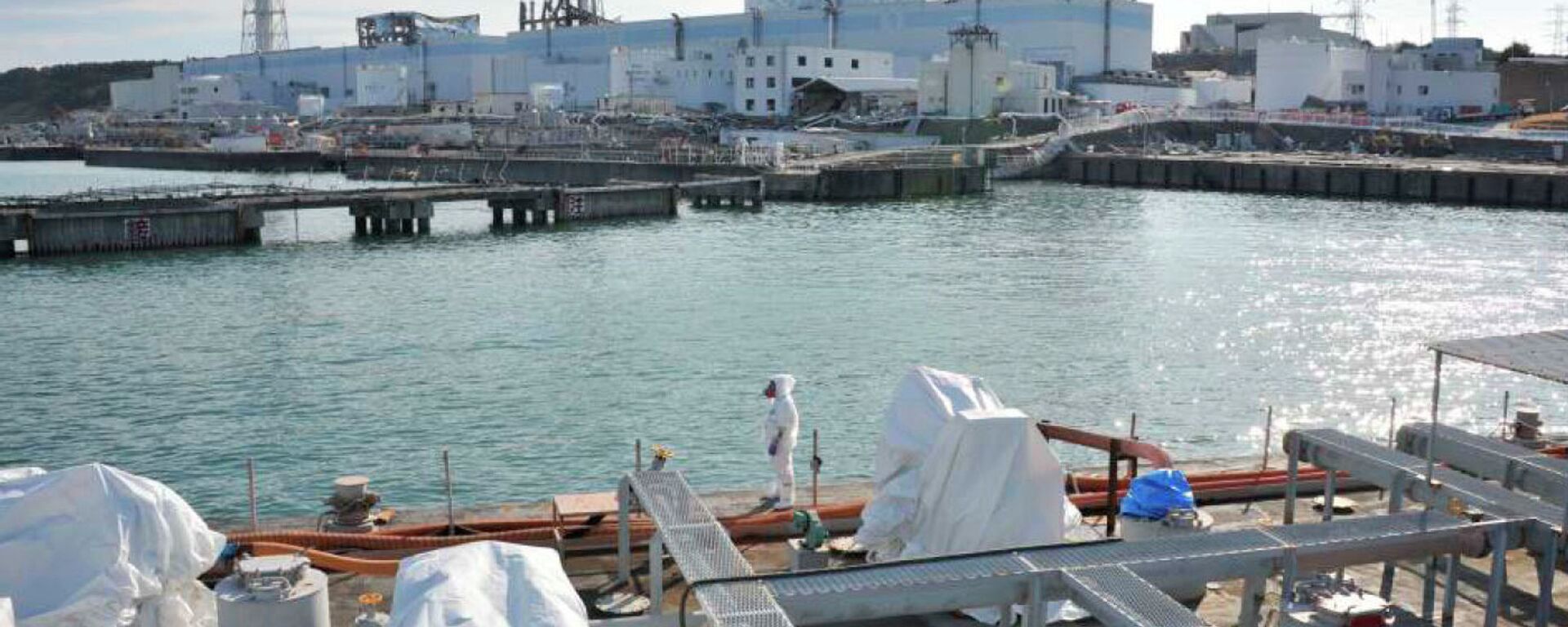Academic: Pacific Drills by US, Allies Seek to Reassert Bygone ‘Glory Days of Cold War’

© AFP 2023 / TED ALJIBE
Subscribe
US posturing in the Indo-Pacific region is based on attempts to revive a late-20th-century logic that is extremely dangerous in the present climate, a political scientist told Sputnik. Would-be US allies in the region should be wary of joining such a project.
The United States and several of its allies in the Western Pacific have been holding a slew of large military drills in recent days, just after Biden assembled several of them to lay the foundations of yet another anti-China bloc.
The US, Japan, Australia and the Philippines assembled a large fleet of assault ships in the South China Sea for drills this week, including Japan’s aviation destroyer JS Izumo, an aircraft carrier in all but name, Australia’s amphibious assault ship HMAS Canberra, the Philippines’ landing platform dock BRP Davao del Sur. Absent from the group was the USS Ronald Reagan aircraft carrier, which returned to port in Japan after conducting separate drills with many of the ships assembled for these exercises.
Meanwhile, South Korea has held its biggest nationwide defense drills in six years amid the annual Ulchi Freedom Shield exercises with the US, and US and Australian troops drilled in the Malabar exercises off Australia's east coast.
Last week, US President Joe Biden hosted the leaders of Japan and South Korea at Camp David outside Washington, DC, in an attempt to lay the groundwork for a new effort to isolate China.
Joe Siracusa, a political scientist and the dean of Global Futures at Curtin University, told Sputnik these kinds of maneuvers were borne of the “glory days of the Cold War,” but clearly haven’t been applicable in the modern world for decades.
“I've been writing about and talking about the trilateral meeting at Camp David. These kinds of exercises are important, and it reinforces the idea that America's trying to create a NATO-like shield in that part of the world as a deterrent to the Chinese. Now, deterrence is an objective. How you get there is called ‘containment’. And so these military exercises - that is the Australian-Japanese exercises, the American-South Korean exercises - are all supposed to mesh together to produce sort of this monolithic approach to dealing with China,” he explained.
“My argument here is - and I've been a student of these things for over 50 years - is that deterrence, as it developed during the Cold War, never seemed to work perfectly after the Cold War. I mean, deterrence never stopped the North Koreans from doing what they were doing. It never stopped the North Vietnamese to do what they were doing. In fact, it never stopped Russia from doing what it was doing in the 60s, 70s and 80s. And in other words, there's a great deal of investment and time and energy in this thing called ‘deterrence’ on the road to containment.”
“Now, America's got bases all over the world. It's got all kinds of physical presence in South Korea and in Japan, though Japan doesn't want to see technically, legally, publicly American nuclear material coming into their bases. And they're quite sensitive about that kind of thing. I couldn't tell you why exactly, because the Japanese fought their own war in the Second World War, and they are too sensitive about anybody.”
“In other words, we’ve got all these smaller alliances, and America encourages the Australians to work with the Japanese not as a substitute, but to reinforce their interoperability and maybe even one day their interchangeability,” he noted.
“Australia is the southern flank of America's policy in the Pacific; Japan and South Korea are the northern flank. Whatever cooperation goes on there is part of creating this sort of monolithic approach to China. Now, will China take the bait? Well, at the end of the day, these alliances mean almost nothing, depending on who's in Washington. So you can have alliances, but you don't have leadership in Washington. None of it makes any sense. And if you get someone like Donald Trump coming back in 2024, this kind of effort is wasted,” he noted, adding that the trilateral summit last week was supposed to “institutionalize” that cooperation.
Siracusa said he was concerned that in the coming years, nations like the US, China and Russia would be in direct danger of crossing each others’ red lines - something extremely dangerous when the parties are all armed with nuclear weapons.
“So, America and Russia are going to have to learn how to do some things together,” he said. “America and China are going to have to learn how to do some things together.”
“And these exercises are designed to send signals to China, particularly. I mean, people in America think that China and Russia are in bed together and Russia is now playing second fiddle to Chinese superpower status. That's nonsense. None of that is true. Absolutely, China has its own interests. Russia has its own interests as, indeed, NATO nations and America has its own interests. This idea that we're all on the same page, that's a bit of a stretch of the imagination.”
“These particular exercises are designed to give weight to the American concept of containment. In the glory days of the Cold War it might have worked. It doesn't work now and it hasn't worked for the last 10 years. So in a way, if something doesn't work, it tends to be more provocative than defensive. So now we have to be very careful about who's red lines we cross in the South and the East China Sea.”





